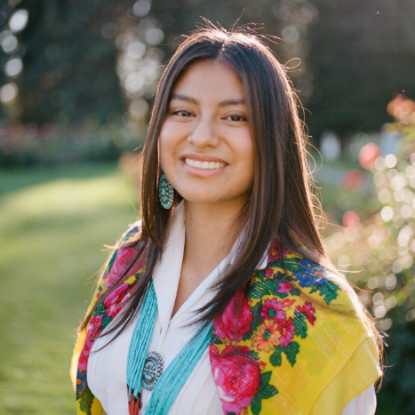
Before graduation, Dr. Joe Johnston sat down with Morgan Yazzie, Sociology Major, Political Science Minor, to look back at her Gonzaga journey, and look forward to what is next as she moves into the world.
Dr. Joe Johnston: Alright, Morgan. So why did you stick with the major/majors? Were there times where you doubted your Sociology and/or Criminology major or considered changing majors?
Morgan Yazzie, '24: Yeah. So I took an introductory class, Sociology 101 with Professor Jamella Gow. I was just so awestruck of the topics that we learned in the case studies that we investigated, even on such a micro level, it was impactful on a bigger scale that I really had not encountered before. When I took her introductory class, I was majoring in a different field, so she was definitely the gateway into the sociology field, and I don't think there could have been a better person for me to introduce me to that, that whole sociological world. When I changed my major to sociology, it was like, one of the best decisions. But also within the past year, I've definitely had, 100% had, doubt in my major. Especially with a lot of the new changes that were happening around the university, too, so it was definitely easy to get into that state of doubt. Especially because a lot of people tend to doubt the social science field. So, yeah, there was definitely moments of doubt where I wondered if I should still stick with it, or if I should, you know, revert back to my other major that I had declared a few years ago. But I've just found that ultimately, the people, the professors, my peers, I think they just make sociology, the department, so much better. Even though I did have doubts, I think the wanting to stay was just the best decision for me ultimately.
Joe: So glad you did. So you spoke to this a little bit already, but what specific course/ courses experience/experiences, people, and/or maybe assignments or projects do you want to remember from your sociology major, and why?
Morgan: My second semester, or I guess, the first semester that I was officially a sociology major, I took Dr. Andrea Brower's, capitalism, environmental justice and resistance class, and that was just one of the most transformative classes, and I was also taking Dr. Gow's race and ethnicity class too. Seeing how both race and ethnicity ties with the intersections of capitalism, and settler colonialism, was very, I don't want to say interesting, but it was just so it was so mind boggling, because it was happening, it is happening in real time, too. To see it unfold, and to see how it unfolds from the past, and see how it is still affecting us today, and how it could have eventually impact us in the future was so, so wild to me. Those have been my two favorite classes that I've taken here. And I highly recommend for anyone to take those classes. I don't think race and ethnicity is still offered, but yeah, just the introduction to capitalism and what that has done environmentally, which is something that I personally have such a passion for, on an environmental scale and on a global scale, and see how that intersects with so many things within our lives today.
Joe: Thank you. So third question is, what are you hoping to do in your post Gonzaga life? And how do you think sociology might connect to some of those hopes?
Morgan: Yeah, that's a pretty big question. But my grandmother always taught me to give back to where you come from, and for the longest time I didn't really know what that meant, or what path to take with that. So post Gonzaga life, and this is just me manifesting it, I hope to attend the University of Arizona and study Indian tribal law to help, whether it's my tribe or another tribe within Indian country, to maintain sovereignty and self-determination. And to bring some sort of, if possible, socioeconomic change. Even though that doesn't happen overnight, it's definitely something that we can dream of, in a capitalist society. Nothing immediately after, no set plans, but within two years I hope to be in law school, and after that three years become a practicing attorney.
Joe: So last question, is there anything else you'd like to share?
Morgan: Yeah. I think, or I know, that the sociology and criminology departments are such unique departments within Gonzaga. I've definitely found a piece of myself with looking at things through a sociological lens, and seeing how that has impacted my life in so many ways. Also thinking about the professors, there are so many great professors here that I didn't get a chance to meet until my last year. But seeing how they communicate and how they care for their students is definitely something that I have not seen personally with other departments. It's really such a breath of fresh air when I walk through the sociology and criminology departments too because I know that they care for me on a academic level, but it's a lot deeper and it's definitely personal too. The information that I've engulfed is truly something that I'll never forget.
